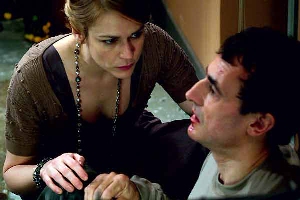Mark:
There is nothing more unpleasant than a film that thinks it is smarter than you. The final revelation that would turn the film on its head became a popular technique in the 90s, spurred by the success of films like The Usual Suspects and The Sixth Sense. Sometimes the technique works, as in The Usual Suspects which remains a longstanding favourite for many film buffs, but Love Me No More (Deux jours à tuer) just becomes more unpleasant.
Something isn’t right in the world of Antoine (Albert Dupontel), and like a character afflicted by a truth-telling serum in a bad Jim Carrey movie, he just has to tell the world. The problem facing the demanding client in his advertising firm isn’t that Antoine’s pitch is on the nose, they just make bad yoghurt. His wife and children have trapped him in a dull life while his friends are ignorant and pretentious. Deciding to let them all know how he really feels will land Antoine with bruises and the isolation he seems to really desire.
The problem facing the demanding client in his advertising firm isn’t that Antoine’s pitch is on the nose, they just make bad yoghurt. His wife and children have trapped him in a dull life while his friends are ignorant and pretentious. Deciding to let them all know how he really feels will land Antoine with bruises and the isolation he seems to really desire.
The biggest problem in watching a film like Love Me No More is that the audience is never given the opportunity to develop a rapport with the lead character, meaning that when Antoine begins to behave badly it is hard to care about him or the consequences. It is almost dishonest to start the film just at the crisis moment, and then demand the audience care in the final act – if not dishonest, it is at least asking far too much. While some will cheer at Antoine’s treatment of his yoghurt client, the sequences in which he celebrates his birthday with his wife and two young children are simply unpleasant.
The fact that Antoine can evoke even the slightest amount of sympathy is largely the responsibility of Dupontel, whose performance is measured and calculating. The internal conflict evident behind his eyes is a hard acting task to successfully pull off, and yet Dupontel succeeds. Perhaps it is recollections of past performances that subconsciously encourage a degree of sympathy with his character, because, as written in the screenplay, he is intolerable.
The remaining cast are supporting players to Dupontel only, and both Marie-Josée Croze (as Antoine’s wife Cécile) and Pierre Vaneck (as his father) are adequate in their roles. The film is mercifully brief at just 85 minutes, although perhaps five minutes at the top end allowing Antoine even one or two positive character attributes would have made the film easier to bear. Writer/director Becker must accept much of the responsibility for the film’s flaws.
The strange thing about all of the problems of the film is that it does make us believe the characters and their pain, and in this regard it can be considered successful. An unpleasant film is not necessarily a bad one, and Love Me No More is certainly not a failure. Its strengths are overshadowed by its structural deficiencies and the unhappy use of the ‘gotcha!’ that will make many viewers simply shrug while others will find they like the film even less. Hard to recommend.
Rating: